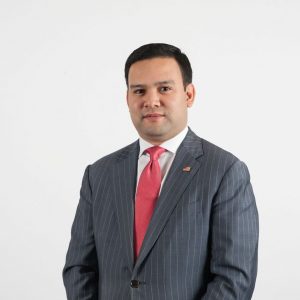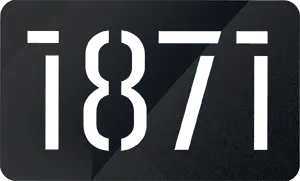
Mark Vargas, President of Licentiam
Twelve Latinx-led startups joined 1871 in late October for a 12-week accelerator program co-facilitated by 1871 and the Illinois Hispanic Chamber of Commerce. As they progress through the cohort program and prepare for their Demo Day March 1, we’ll be posting Q&As with each company on the 1871 blog to introduce them to the community.
This week, Mark Vargas, President of Licentiam, talks about his RegTech platform that aims to streamline the licensing process for medical professionals nationwide.
Tell us a little bit about your personal history and background.
The son of a truck driver and preschool teacher, I was the first to graduate from college in my family. Shortly after graduating from Judson University, I moved to Washington, D.C. From 2007-2010, I served as a civilian within the Office of U.S. Secretary of Defense Robert Gates, where I traveled to Baghdad, Iraq fourteen times as a civilian advisor to senior Iraqi government officials, cabinet ministers and business leaders on economic development and reconstruction as part of the U.S. counterinsurgency strategy.
In 2014, I was a senior healthcare consultant to Washington, D.C. Mayor Vincent Gray, where I coordinated our locally-based private sector initiative, Stronger2gether – a program designed at improving birth outcomes and lowering the infant mortality rate by utilizing predictive health analytics. I also served as the spokesperson for this initiative, and testified frequently as an expert witness before the Committee on Health and Human Services.
Tell us a little about your company. What’s your elevator pitch?
Licentiam – which means “license” in Latin – is a RegTech platform designed by physicians and health regulators for physicians and health regulators, to expedite the physician licensing process within states and to provide a mechanism to share licensing information between states.
But who cares, and why does this matter? Currently, states are issuing physician licenses using outdated, legacy systems that can’t communicate with each other. And in some states, it’s still paper-based. What this means is that the process to obtain a medical license can take months. Moreover, health regulators will be able to communicate and share information with other states – creating an expedited and thorough process for health licensing. A win for the physician, a win for the health regulator and a win for patients who need access to quality care.
How did you come to join the cohort?
I visited 1871/IHCC on June 2, 2016 when former Governor of Puerto Rico Luis Fortuno and I were in town from Washington, D.C. for the day to attend events and deliver a few speeches. One of the visits on our schedule was to IHCC, where Omar Duque, IHCC’s CEO, had organized an event for the former governor to meet with local Hispanic business leaders and to tour 1871.
A few months later, I called Omar to seek his advice on my tech startup – and he excitedly mentioned this brand-new incubator, and suggested that I apply. The rest is history!
What has your experience been so far?
Unbelievable! The resources that an 1871/IHCC membership provides are invaluable. It’s also encouraging to see so many people committed to our success. Our weekly cohort meetings are both challenging and encouraging. You can’t help but walk away each week inspired to be a better entrepreneur and inspired about the future of Hispanic-owned tech startups.
What about the program do you think will help your business the most? How will it help your business?
The guidance, mentorship and resources available to us, as well as the access to key people within the tech startup community – particularly the angel investment and venture capital communities will be essential in helping us get off the ground. Already, we are seeing tremendous progress – and we’re only a month into our cohort!
Where do you see your business at the end of the program, and what is your ultimate goal for your company after that?
By the end of the program, we will have identified a technology partner, built out an MVP, secured angel investment for seed funding and deployed our platform for a customer to pilot. The ultimate goal of course is deploying our platform and generating revenue.
While our initial focus will be on physician licensing, the long-term goal for our company is to be the premier regulatory technology platform for all health practitioner licenses across the U.S.
What’s the greater good your company is trying to accomplish? How will it impact the community? What problem does it solve?
For physicians, they’ll be able to manage, apply for and renew their license for one or multiple states on a simple platform – and save time.
For health regulators, they’ll be able to expedite the license approval process, reduce processing times by as much as 50-percent, reduce paper footprint by as much as 75-percent and share information amongst different states.
For patients, expedited physician license processing and more regulatory transparency means greater access to good doctors and better quality of care.
Give us a little insight into your perspective on diversity in the tech community. Why is it important? What do you hope to see?
One of the greatest challenges for any tech startup is identifying funding. And for Hispanic-owned tech startups, that challenge is even greater. Hispanic entrepreneurs are starting businesses at a rate 15 times faster than the national average, yet less than 1-percent of Hispanic-owned tech startups receive any funding at all. This narrative needs to change, and thanks to the visionaries at 1871/IHCC, we’re going to do just that! Imagine the economic growth and job creation once Hispanic-owned tech startups begin to raise capital across the country. And that day, I believe, is a lot sooner than you think. And we’ll have the teams at 1871/IHCC to thank for it.
You can find Licentiam and Mark on Twitter at @LicentiamTeam and @MarkAVargas.
Join as an 1871 Early Stage Member.
Attend info sessionSubscribe to our ICYMI newsletter.
Share this post:
